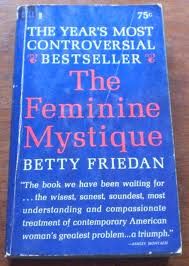

Fifty years after the publication of the Feminine Mystique, historian Stephanie Coontz applies her usual genius to the question of why gender equality has stalled in the New York Times.
As Coontz writes, today’s women and men hold egalitarian values – most of us believe that both men and women should work and should share housekeeping and childcare duties. But few of us can live up to these values, largely because of “structural impediments” – lack of maternity leave, incredibly long work hours, lack of reasonably priced childcare. So women end up dialing back their career ambitions, whether or not they want to. Fewer mothers are working than in the 1990s, women’s labor force participation has stalled across the board, and there’s still a gender wage gap in nearly every field.
“The gender revolution is not in a stall. It has hit a wall,” Coontz writes.
But since no one wants to feel like they’re a pawn in the system, we women tend to justify our decisions in terms of “personal choice:”
Some people began to argue that feminism was not about furthering the equal involvement of men and women at home and work but simply about giving women the right to choose between pursuing a career and devoting themselves to full-time motherhood. A new emphasis on intensive mothering and attachment parenting helped justify the latter choice [we see a lot of this in New Domesticity]…Anti-feminists welcomed this shift as a sign that most Americans did not want to push gender equality too far.
But women shouldn’t have to make these choices between work and family. And they shouldn’t have to feel like, when they fail at balancing both, it’s their fault. As Coontz writes:
Our goal should be to develop work-life policies that enable people to put their gender values into practice. So let’s stop arguing about the hard choices women make and help more women and men avoid such hard choices. To do that, we must stop seeing work-family policy as a women’s issue and start seeing it as a human rights issue that affects parents, children, partners, singles and elders. Feminists should certainly support this campaign. But they don’t need to own it.
Amen.

